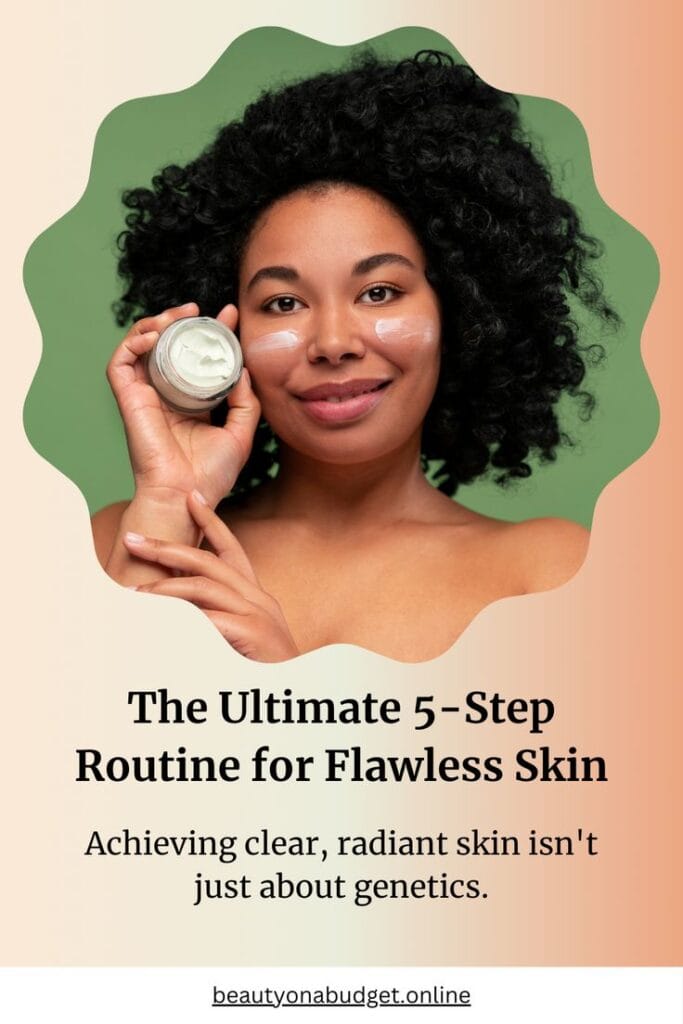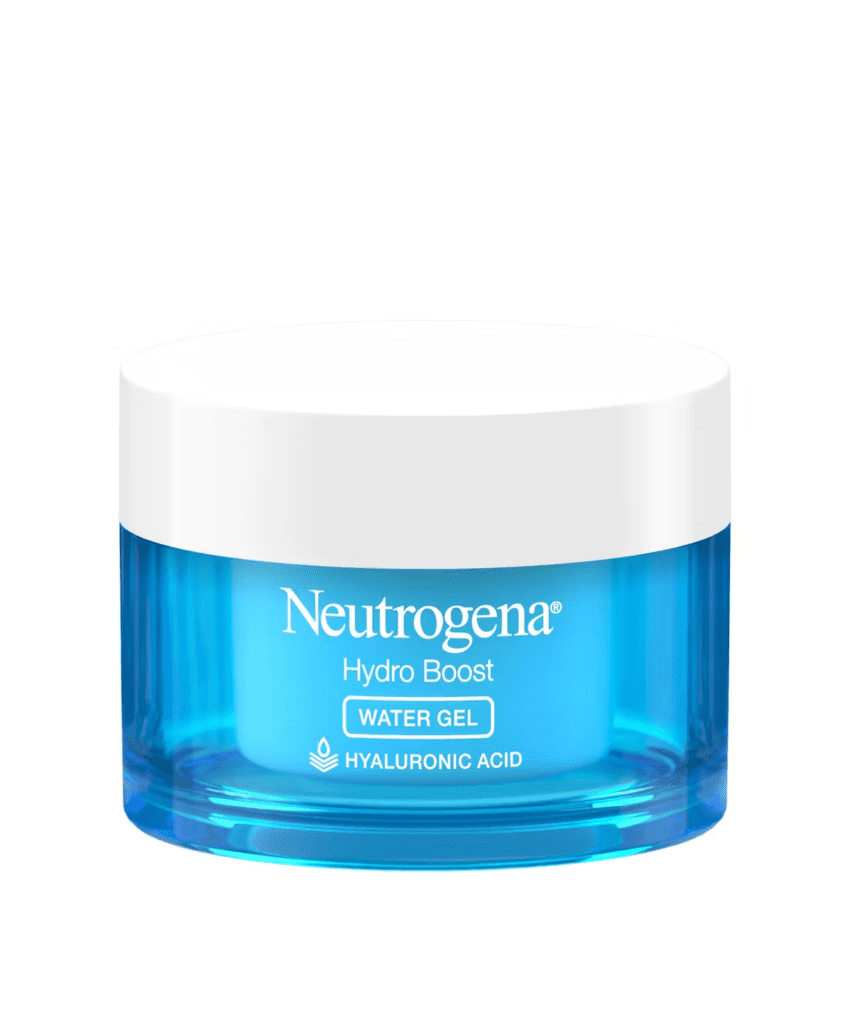Do you dream of having perfect skin?
Achieving clear, radiant skin isn’t just about genetics; it’s about dedication to a proper skincare routine. While a basic 3-step cleanse-tone-moisturize routine might be sufficient for some, those seeking to target specific concerns like acne, hyperpigmentation, or dryness will benefit from a more targeted approach. This article unveils a powerful 5-step skincare routine for flawless skin.

Cleanse: The Foundation of a Good Skincare Routine
The journey to flawless skin starts with a clean slate. Cleansing is crucial for removing dirt, oil, makeup, and impurities that can clog pores and dull your complexion. The key to effective cleansing is choosing the right cleanser for your skin type:
- Dry Skin: Harsh cleansers can strip away natural oils, leaving your skin feeling tight and uncomfortable. Opt for gentle, hydrating cleansers formulated with ingredients like hyaluronic acid, ceramides, or glycerin. Cream cleansers are also a good choice for dry skin, as they leave behind a nourishing residue.
- Oily Skin: If you struggle with excess oil and shine, gel cleansers or foaming cleansers are your best bet. These formulas effectively remove oil without being overly drying. Look for cleansers containing hyaluronic acid or niacinamide, which can help control oil production while still keeping your skin hydrated. For acne prone skin, cleansers with Benzoyl Peroxide or Salicylic Acid could minimise breakouts.
- Combination Skin: This skin type can exhibit characteristics of both dryness and oiliness so you’re looking for the best of both worlds. Find a gentle gel cleanser or even a cream-to-foam cleanser.
- A gentle, micellar water or cleansing oil are good choices for makeup removal. They effectively remove makeup and impurities without disrupting the skin’s natural moisture barrier.
Note that regardless of your skin type, your daily cleanser should be a gentle, non-stripping cleanser. Avoid using exfoliating cleansers daily.
Toning: Prepping Your Skin for Absorption
Toners were traditionally used to restore the skin’s pH balance after cleansing. However, many modern cleansers are already formulated at a pH level close to that of the skin, making this step less crucial. Still, toners continue to offer additional benefits depending on the formula you choose:
- Hydrating toners with ingredients like hyaluronic acid or rose water provide an extra layer of moisture and prep the skin for better absorption of subsequent products.
- Soothing toners with aloe vera or green tea can calm irritation and redness, making them ideal for sensitive skin.
- Exfoliating toners with AHAs or BHAs offer a gentle form of exfoliation, but be cautious if you already use an exfoliating cleanser or chemical exfoliant.
- Brightening toners with vitamin C or licorice root extract can help even skin tone and reduce hyperpigmentation.
Exfoliation: Buffing Away Dullness (But Not Too Much!)
While cleansing removes surface dirt and oil, exfoliation goes a step deeper by removing dead skin cells that can clog pores and contribute to a dull appearance. However, exfoliation should be done sparingly, especially for those with sensitive skin. Over-exfoliation can strip away the skin’s natural oils and irritate it.
- Exfoliating cleansers can be a convenient option for those with oily or combination skin. Use them 2-3 times a week, but avoid using them daily.
- Chemical exfoliants like AHAs (alpha hydroxy acids) or BHAs (beta hydroxy acids) can be a more targeted approach. AHAs, like glycolic acid or lactic acid, work on the surface of the skin to remove dead skin cells and promote cell turnover. BHAs, like salicylic acid, penetrate deeper into pores to clear out congestion and fight acne. Choose the type of chemical exfoliant based on your specific concerns and introduce it gradually into your routine, starting with once or twice a week.
I recommend using exfoliants only at night to avoid exposing sensitive skin to the sun.
Serums: Targeted Treatments
Serums are concentrated treatments packed with potent ingredients designed to address specific skin concerns. Unlike moisturizers, which primarily focus on hydration, serums penetrate deeper layers of the skin to deliver a targeted dose of active ingredients. Here are some popular serums and their benefits:
- Antioxidants: Packed with antioxidants like vitamin C, niacinamide, or green tea extract, these serums combat free radical damage, which can contribute to wrinkles, hyperpigmentation, and loss of elasticity. Perfect for daily, daytime use.
- Hyaluronic acid: Hyaluronic acid is a humectant that attracts and retains moisture in the skin, making it ideal for those with dry or dehydrated skin.
- Retinol: Retinol is a powerful anti-aging ingredient that stimulates collagen production, reduces wrinkles, and improves skin texture. However, retinol can be irritating, so it’s best to start with a low concentration and use it at night only.
- Vitamin C: Vitamin C brightens the skin, fades hyperpigmentation, and protects against sun damage. Look for vitamin C serums that are formulated with stabilizers to prevent them from degrading in sunlight.
Moisturize: Locking In Hydration
Regardless of your skin type, proper hydration is essential for maintaining a healthy, plump complexion. Moisturizers act as a barrier, preventing moisture loss from the skin. Choose a moisturizer based on your skin type and the season:
- Dry Skin: Look for rich, cream-based moisturizers formulated with emollients like shea butter or ceramides to lock in moisture. Consider incorporating facial oils like jojoba or rosehip oil for extra hydration.
- Oily Skin: Opt for lightweight, oil-free moisturizers with a gel or lotion consistency. Look for ingredients like hyaluronic acid, which provides hydration without feeling greasy. Find products for acne-prone skin.
- Combination Skin: Choose a non-comedogenic moisturizer that hydrates without clogging pores. Gel-creams are a good option for this skin type.
Sunscreen: The Ultimate Shield
Sun damage is one of the leading causes of premature aging, wrinkles, and hyperpigmentation. Sunscreen is non-negotiable in any skincare routine, regardless of the season or weather. Here’s why sunscreen is crucial:
- UV rays: UVA rays penetrate deep into the skin’s dermis, damaging collagen and elastin, which leads to wrinkles and loss of firmness. UVB rays are responsible for sunburns and contribute to hyperpigmentation.
- Daily use is essential: Even on cloudy days, UVA rays can penetrate the clouds and damage your skin.
Choose a broad-spectrum sunscreen with SPF 30 or higher for daily use. Look for a formula that is non-comedogenic and feels comfortable on your skin. Reapply sunscreen every two hours, or more often if you’re sweating or swimming.
RECAP
Morning 5-step routine
- Cleanser
- Toner/essence/ampoule
- Serum
- Moisturiser
- Sunscreen
Evening 5-step routine
- Cleanser
- Hydrating toner/essence/ampoule
- Exfoliator
- Serum
- Moisturiser
Remember, Consistency is Key!
Achieving flawless skin is a marathon, not a sprint. The key to seeing results is consistency. Stick to your skincare routine twice a day, every day. Pay attention to how your skin reacts to different products and adjust your routine accordingly. Don’t be afraid to consult a dermatologist if you have persistent skin concerns. With dedication and the right routine, you can achieve the beautiful, radiant skin you’ve always dreamed of.
REFERENCES
Finding the best cleanser for oily skin: https://www.cerave.com/skin-smarts/skincare-tips-advice/choose-best-oily-skin-face-wash-cleanser



